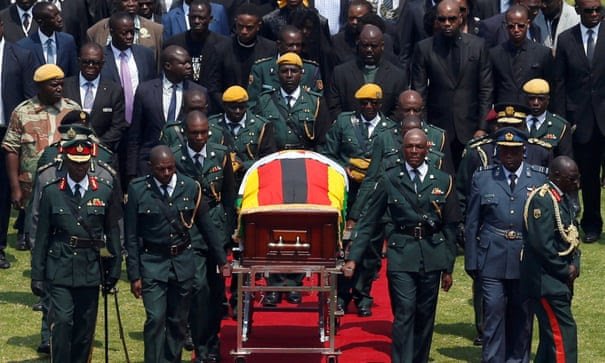
Thousands of mourners sang the praises of Robert Mugabe on Saturday at the official funeral ceremony for the Zimbabwe’s founding president in Harare.
A military brass band led family members, officials from the ruling Zanu-PF party and foreign dignitaries from across Africa on a short parade across the grass of the national stadium in front of the coffin, which was draped in the national flag.
Mugabe died earlier this month aged 95 in a clinic in Singapore.
The South African president, Cyril Ramaphosa, was among the current and former heads of state to attend. Many in Zimbabwe have been critical of his handling of an outbreak of xenophobic violence in South Africa, and he was booed by some in the stadium.
A number of Zimbabwe’s opposition leaders were also present. Job Sikhala said he had come to offer his condolences to the bereaved family.
Walter Chidakwa, a relative of Mugabe, spoke first, and said the former guerrilla leader turned authoritarian ruler had loved his people.
The service follows an announcement by his family and Zimbabwe’s president, Emmerson Mnangagwa, that his burial will not take place for at least a month, until his mausoleum has been built at the National Heroes Acre monument.
Mugabe’s death has left Zimbabwe torn over the legacy of his 37-year rule, which was marked by repression and economic crisis.
He died almost two years after former army loyalists forced him out of office in 2017 following a power struggle over what was widely perceived as his bid to have his wife, Grace, succeed him.
His body was returned from Singapore on Wednesday to a country still struggling with inflation and food and fuel shortages caused by decades of economic mismanagement.
“Despite certain misgivings, within certain quarters about his so-called mistakes … the government’s position is clear,” the foreign minister, Sibusiso Moyo, told Agence France-Presse. “The late President Mugabe is an icon.”
Mugabe ended white-minority rule in Zimbabwe and improved access to education and health services for the country’s poor black majority, but he soon began to resort to fear and repression to govern.
Many Zimbabweans will remember Mugabe more for his economic mismanagement and increasingly tyrannical rule that followed the initial hope of liberation. Millions fled the country to escape decades of hyperinflation and crackdowns on dissidents.
Many are struggling to survive in the post-Mugabe era. “Things were much better under Comrade Mugabe, prices of basics were lower,” said Daydream Goba, 27. “Now, we can barely manage.”
Mugabe’s funeral arrangements were also the subject of a dispute between Mnangagwa and the family over where and when the former leader should be buried.
His family are still bitter over the role Mnangagwa played in his ousting and had pushed for Mugabe to be buried in his homestead of Zvimba, north-west of Harare.
A former guerrilla who fought alongside Mugabe against colonial forces, Mnangagwa was fired as first vice-president and branded a traitor.
Protesters and military officers pressured Mugabe to step down soon after, in what was widely seen as a struggle between Mnangagwa’s faction and loyalists to Grace inside the ruling Zanu-PF party.
The “heroes” monument, where more than 130 national figures are buried in black marble tombs, sits on a hilltop overlooking Harare. Mugabe’s first wife, Sally, is also buried there.
(The Guardian)










Recent Comments